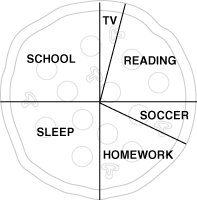Time Management for Gifted Kids
Time Management for Gifted Kids
Learn to Tame Time
Gifted kids find it especially difficult to manage their time. When a child is so interested and stimulated by her world, school projects and after-school programs can easily become overwhelming. Highly motivated minds may tend towards perfectionism and idealism, leading many gifted kids to overcommitment and even burnout. You are your child's best resource, so become her time-management expert now and launch into a smooth back-to-school routine.
Know Your Child
More specifically, know your child's learning style. Is he an analyzer or a visualizer? Does he think step-by-step or more holistically?
Knowing how your child learns and thinks will help you choose the tool that's right for him to get organized. Will it be a grid or a picture? A to-do list or a flow-chart?
Many gifted kids don't want to structure their time, so prepare yourself to be flexible and creative. Organizing just one day might be a good way to show him the limitations of his time and the priority-setting he'll need to do.
Before you sit down with him, know your own plan for homework rules, regular routines, and free-time choices.
Know Your Plan
Before your child can master time, you'll need to set some ground rules.
Time Tools
Setting up a way to manage your gifted child's time depends in large part on how your child thinks.
Logical, analytical thinkers keep neat notebooks and like to organize. Their sock drawers are neat. Creative, holistic, or "feeling" thinkers have looser ways of keeping organized. They might keep their socks on the floor, over the door, and in the drawer -- but they know where they are!
Keeping your gifted child's mind in mind, here's your jumping off point for finding the right time-management tool. Play and experiment with the following examples. You and your child will have time right where you want it.
Charts and Pictures
Planning by Picture
One way to engage kids who are visual learners is to make a time chart that looks like a favorite topic.
For example, start with a large multi-tiered hamburger. In a 24-hour day, how much lettuce, cheese, or ketchup will he need? Is cheese the homework? Is the sauce his free time? Let your child have fun deciding.
Planning by Pie Chart
Try planning by pie chart! Here's an example.
Print out your own blank pizza chart to schedule on!
Use anything that will serve the end goal: a system for time management that keeps your child involved in her own successful planning.
Ready for more Resources? Try These:
CEC Approved and Suggested Books
Grids and Lists
Here are some examples for setting up a schedule. The priorities for each activity will change daily. One day, for example, the long-term research paper might not be as important as practicing for an upcoming recital. And remember to "plan for planning." Balancing long- and short-term goals takes energy, thought, and time!
Choose a few of the designs below, try them out with your gifted child, and decide together what's best for now. If you need to, you can reinvent your tool anytime. What's important is that you get started before school does.
Planning by Activity
| Friday | |
| Activity | Hours |
| Sleeping | 8 |
| Dressed & Ready | 1 |
| To & From School | 1 |
| School | 6 |
| Planning | .5 |
| Snack | .5 |
| Homework | 1 |
| Hobby (pet rabbits) | 1 |
| Sports | 0 |
| Play (friend over) | 1.5 |
| Dinner | 1 |
| Chores | .5 |
| TV | 0 |
| Reading | 1 |
| Unscheduled | 1 |
| TOTAL | 24 |
Planning by Time
| Monday | |
| Time | Activity |
| 6 a.m. | Get Ready |
| 7 a.m. | Travel |
| 8 a.m. | School |
| 9 a.m. | - |
| 10 a.m. | - |
| 11 a.m. | - |
| 12 p.m. | - |
| 1 p.m. | - |
| 2 p.m. | Travel |
| 3 p.m. | Snack |
| 4 p.m. | Homework |
| 5 p.m. | - |
| 6 p.m. | Dinner/Chores |
| 7 p.m. | TV |
| 8 p.m. | Favorite Project |
| 9 p.m. | Reading |
| 10 p.m. | Bed |
Planning by To-Do List
| Wednesday | |
| Priority | Activity |
| 1 | Homework |
| 5 | Research Paper |
| 2 | Soccer Practice |
| 4 | Reading for Fun |
| 3 | Dishes |
| 6 | Clean up Room |
 | Brought to you by the Council for Exceptional Children |
